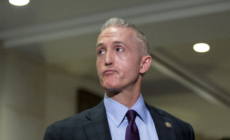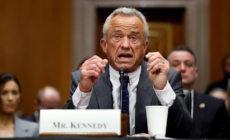-
Fox News Host Criticizes Trump Over Kilmar Abrego Garcia Case - 22 mins ago
-
OpenAI Unveils New ‘Reasoning’ Models o3 and o4-mini - 39 mins ago
-
Senior US Air Force Special Ops Leader Fired—Internal Email Leaked - 57 mins ago
-
California helicopter business sold used parts as new, risking customers’ lives, indictment says - about 1 hour ago
-
Fed Chair Lays Out Game Plan in Case of High Inflation and Slower Growth - about 1 hour ago
-
Braves-Dodgers Trade Idea Gives Atlanta New Options at Multiple Positions - 2 hours ago
-
Cubs Prospect’s Sudden Demotion After 18 Games Has One Bright Side - 2 hours ago
-
European Spa Company Therme Misrepresented Itself in an Effort to Expand Into Canada - 2 hours ago
-
Los Angeles jury awards $48 million to students abused by teacher at South El Monte school - 2 hours ago
-
Who Is Walter Zahorodny? RFK Jr.’s Expert on Autism - 3 hours ago
Trump Ally Warns Swing State’s Voters ‘Highly Concerned’ About Tariffs
Republican Senator Ron Johnson of Wisconsin warned on Friday that the swing state’s voters are “highly concerned” about President Donald Trump’s tariffs.
Newsweek reached out to the White House for comment via email.
Why It Matters
Trump on Wednesday announced a new round of tariffs on imports from dozens of countries around the globe, which he said are intended to close the trade deficit and restore U.S. manufacturing.
Economists, however, said the tariffs are going to lead to higher prices for U.S. consumers, and the market reacted negatively to the announcement on Thursday, when the Dow Jones Industrial Average dropped nearly 4 percent.

Greg Nash-Pool/Getty Images
What To Know
Johnson, who is a key supporter of the president, addressed concern among Wisconsin voters during an interview on Fox Business on Friday. He represents a battleground state that narrowly backed Trump last November by less than a percentage point.
Johnson said Trump has “long held” beliefs that tariffs would correct problems faced by the U.S., but that it is “indisputable” the markets are down.
“I’m getting all kids of reactions from businesses, farmers in Wisconsin that are highly concerned about what’s happening,” he said. “Those are the facts. All I can really do is report the reality to the administration, let them know how these actions are impacting my constituents, and it’ll be pretty much up to President Trump and his administration to determine exactly how long they’re going to go down this road.”
He described the tariffs as a “bold, risky move,” and said he cannot predict how they will turn out.
Some other Republican senators have been critical of the tariffs, such as Rand Paul of Kentucky, who has warned that tariffs will come at a cost for the GOP.
Four GOP senators this week voted to end Trump’s emergency declaration on fentanyl trafficking underpinning his tariffs on Canada. Paul, Susan Collins of Maine, Mitch McConnell of Kentucky and Lisa Murkowski of Alaska joined every Democrat.
What People Are Saying
Kentucky Senator Rand Paul, on Fox News this week: “Tariffs have also led to political decimation. When [former president then member of Congress William] McKinley most famously put tariffs on in 1890, they lost 50 percent of their seats in the national election. When [Smoot-Hawley] put on their tariff in the early 1930s, we lost the House and the Senate for 60 years. So they’re not only bad economically, they’re bad politically.”
President Donald Trump, while announcing the new tariffs on Wednesday: “Chronic trade deficits are a national emergency.”
Maine Senator Susan Collins, in a floor speech opposing Canadian tariffs: “Mr. President, the price hikes that will happen for Maine families, every time they go to the grocery store, they fill their gas tank, they fill their heating oil tank, if these tariffs go into effect, will be so harmful. And as price hikes always do, they will hurt those the most who can afford them the least.”
What Happens Next
The 10 percent “baseline” tariffs will take effect on April 5, and the reciprocal tariffs will kick in on April 9. A Budget Lab analysis found that Americans could pay up to $4,200 more per year as a result of the tariffs.
Source link



















